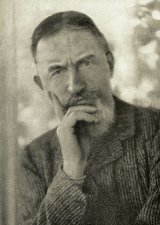Pygmalion Page #11
Pygmalion is a play by George Bernard Shaw, named after a Greek mythological figure. It was first presented on stage to the public in 1913. In ancient Greek mythology, Pygmalion fell in love with one of his sculptures, which then came to life.
HIGGINS [taking out his pocket book and coming between Doolittle and the piano] This is irresistible. Let's give him ten. [He offers two notes to the dustman]. DOOLITTLE. No, Governor. She wouldn't have the heart to spend ten; and perhaps I shouldn't neither. Ten pounds is a lot of money: it makes a man feel prudent like; and then goodbye to happiness. You give me what I ask you, Governor: not a penny more, and not a penny less. PICKERING. Why don't you marry that missus of yours? I rather draw the line at encouraging that sort of immorality. DOOLITTLE. Tell her so, Governor: tell her so. I'm willing. It's me that suffers by it. I've no hold on her. I got to be agreeable to her. I got to give her presents. I got to buy her clothes something sinful. I'm a slave to that woman, Governor, just because I'm not her lawful husband. And she knows it too. Catch her marrying me! Take my advice, Governor: marry Eliza while she's young and don't know no better. If you don't you'll be sorry for it after. If you do, she'll be sorry for it after; but better you than her, because you're a man, and she's only a woman and don't know how to be happy anyhow. HIGGINS. Pickering: if we listen to this man another minute, we shall have no convictions left. [To Doolittle] Five pounds I think you said. DOOLITTLE. Thank you kindly, Governor. HIGGINS. You're sure you won't take ten? DOOLITTLE. Not now. Another time, Governor. HIGGINS [handing him a five-pound note] Here you are. DOOLITTLE. Thank you, Governor. Good morning. [He hurries to the door, anxious to get away with his booty. When he opens it he is confronted with a dainty and exquisitely clean young Japanese lady in a simple blue cotton kimono printed cunningly with small white jasmine blossoms. Mrs. Pearce is with her. He gets out of her way deferentially and apologizes]. Beg pardon, miss. THE JAPANESE LADY. Garn! Don't you know your own daughter? DOOLITTLE {exclaiming Bly me! it's Eliza! HIGGINS {simul- What's that! This! PICKERING {taneously By Jove! LIZA. Don't I look silly? HIGGINS. Silly? MRS. PEARCE [at the door] Now, Mr. Higgins, please don't say anything to make the girl conceited about herself. HIGGINS [conscientiously] Oh! Quite right, Mrs. Pearce. [To Eliza] Yes: damned silly. MRS. PEARCE. Please, sir. HIGGINS [correcting himself] I mean extremely silly. LIZA. I should look all right with my hat on. [She takes up her hat; puts it on; and walks across the room to the fireplace with a fashionable air]. HIGGINS. A new fashion, by George! And it ought to look horrible! DOOLITTLE [with fatherly pride] Well, I never thought she'd clean up as good looking as that, Governor. She's a credit to me, ain't she? LIZA. I tell you, it's easy to clean up here. Hot and cold water on tap, just as much as you like, there is. Woolly towels, there is; and a towel horse so hot, it burns your fingers. Soft brushes to scrub yourself, and a wooden bowl of soap smelling like primroses. Now I know why ladies is so clean. Washing's a treat for them. Wish they saw what it is for the like of me! HIGGINS. I'm glad the bath-room met with your approval. LIZA. It didn't: not all of it; and I don't care who hears me say it. Mrs. Pearce knows. HIGGINS. What was wrong, Mrs. Pearce? MRS. PEARCE [blandly] Oh, nothing, sir. It doesn't matter. LIZA. I had a good mind to break it. I didn't know which way to look. But I hung a towel over it, I did. HIGGINS. Over what? MRS. PEARCE. Over the looking-glass, sir. HIGGINS. Doolittle: you have brought your daughter up too strictly. DOOLITTLE. Me! I never brought her up at all, except to give her a lick of a strap now and again. Don't put it on me, Governor. She ain't accustomed to it, you see: that's all. But she'll soon pick up your free-and-easy ways. LIZA. I'm a good girl, I am; and I won't pick up no free and easy ways. HIGGINS. Eliza: if you say again that you're a good girl, your father shall take you home. LIZA. Not him. You don't know my father. All he come here for was to touch you for some money to get drunk on. DOOLITTLE. Well, what else would I want money for? To put into the plate in church, I suppose. [She puts out her tongue at him. He is so incensed by this that Pickering presently finds it necessary to step between them]. Don't you give me none of your lip; and don't let me hear you giving this gentleman any of it neither, or you'll hear from me about it. See? HIGGINS. Have you any further advice to give her before you go, Doolittle? Your blessing, for instance. DOOLITTLE. No, Governor: I ain't such a mug as to put up my children to all I know myself. Hard enough to hold them in without that. If you want Eliza's mind improved, Governor, you do it yourself with a strap. So long, gentlemen. [He turns to go]. HIGGINS [impressively] Stop. You'll come regularly to see your daughter. It's your duty, you know. My brother is a clergyman; and he could help you in your talks with her. DOOLITTLE [evasively] Certainly. I'll come, Governor. Not just this week, because I have a job at a distance. But later on you may depend on me. Afternoon, gentlemen. Afternoon, ma'am. [He takes off his hat to Mrs. Pearce, who disdains the salutation and goes out. He winks at Higgins, thinking him probably a fellow sufferer from Mrs. Pearce's difficult disposition, and follows her]. LIZA. Don't you believe the old liar. He'd as soon you set a bull-dog on him as a clergyman. You won't see him again in a hurry. HIGGINS. I don't want to, Eliza. Do you? LIZA. Not me. I don't want never to see him again, I don't. He's a disgrace to me, he is, collecting dust, instead of working at his trade. PICKERING. What is his trade, Eliza? LIZA. Talking money out of other people's pockets into his own. His proper trade's a navvy; and he works at it sometimes too--for exercise--and earns good money at it. Ain't you going to call me Miss Doolittle any more? PICKERING. I beg your pardon, Miss Doolittle. It was a slip of the tongue. LIZA. Oh, I don't mind; only it sounded so genteel. I should just like to take a taxi to the corner of Tottenham Court Road and get out there and tell it to wait for me, just to put the girls in their place a bit. I wouldn't speak to them, you know. PICKERING. Better wait til we get you something really fashionable. HIGGINS. Besides, you shouldn't cut your old friends now that you have risen in the world. That's what we call snobbery. LIZA. You don't call the like of them my friends now, I should hope. They've took it out of me often enough with their ridicule when they had the chance; and now I mean to get a bit of my own back. But if I'm to have fashionable clothes, I'll wait. I should like to have some. Mrs. Pearce says you're going to give me some to wear in bed at night different to what I wear in the daytime; but it do seem a waste of money when you could get something to show. Besides, I never could fancy changing into cold things on a winter night.
Translation
Translate and read this book in other languages:
Select another language:
- - Select -
- 简体中文 (Chinese - Simplified)
- 繁體中文 (Chinese - Traditional)
- Español (Spanish)
- Esperanto (Esperanto)
- 日本語 (Japanese)
- Português (Portuguese)
- Deutsch (German)
- العربية (Arabic)
- Français (French)
- Русский (Russian)
- ಕನ್ನಡ (Kannada)
- 한국어 (Korean)
- עברית (Hebrew)
- Gaeilge (Irish)
- Українська (Ukrainian)
- اردو (Urdu)
- Magyar (Hungarian)
- मानक हिन्दी (Hindi)
- Indonesia (Indonesian)
- Italiano (Italian)
- தமிழ் (Tamil)
- Türkçe (Turkish)
- తెలుగు (Telugu)
- ภาษาไทย (Thai)
- Tiếng Việt (Vietnamese)
- Čeština (Czech)
- Polski (Polish)
- Bahasa Indonesia (Indonesian)
- Românește (Romanian)
- Nederlands (Dutch)
- Ελληνικά (Greek)
- Latinum (Latin)
- Svenska (Swedish)
- Dansk (Danish)
- Suomi (Finnish)
- فارسی (Persian)
- ייִדיש (Yiddish)
- հայերեն (Armenian)
- Norsk (Norwegian)
- English (English)
Citation
Use the citation below to add this book to your bibliography:
Style:MLAChicagoAPA
"Pygmalion Books." Literature.com. STANDS4 LLC, 2025. Web. 10 Jan. 2025. <https://www.literature.com/book/pygmalion_78>.




Discuss this Pygmalion book with the community:
Report Comment
We're doing our best to make sure our content is useful, accurate and safe.
If by any chance you spot an inappropriate comment while navigating through our website please use this form to let us know, and we'll take care of it shortly.
Attachment
You need to be logged in to favorite.
Log In